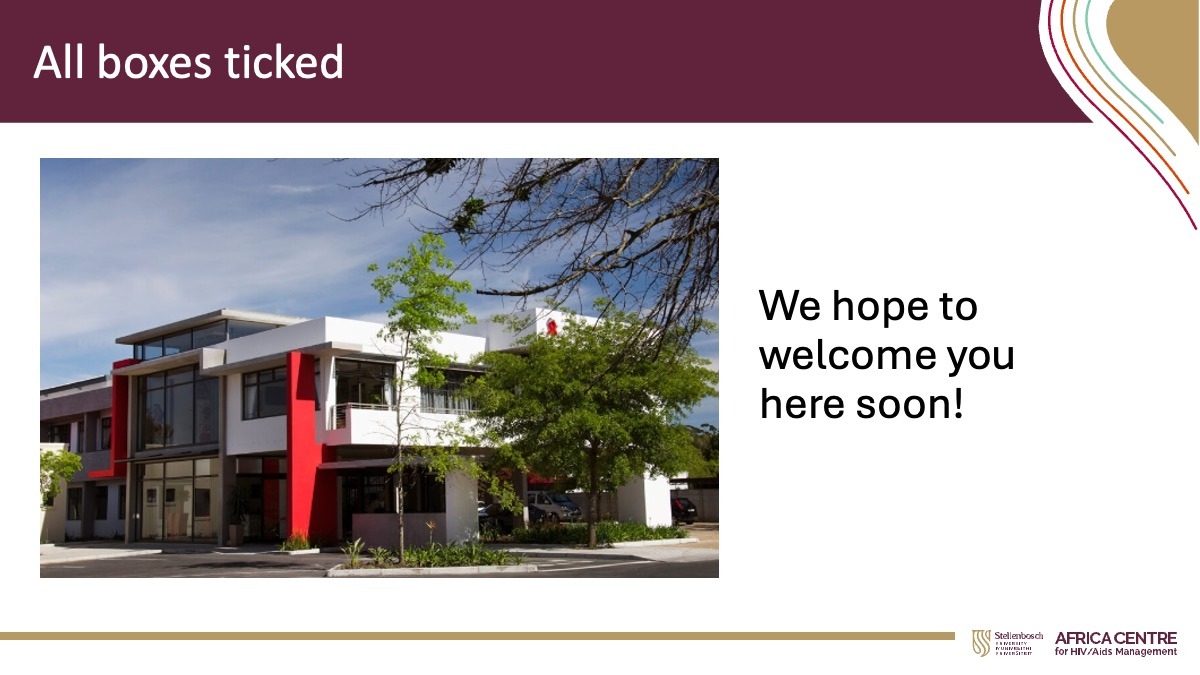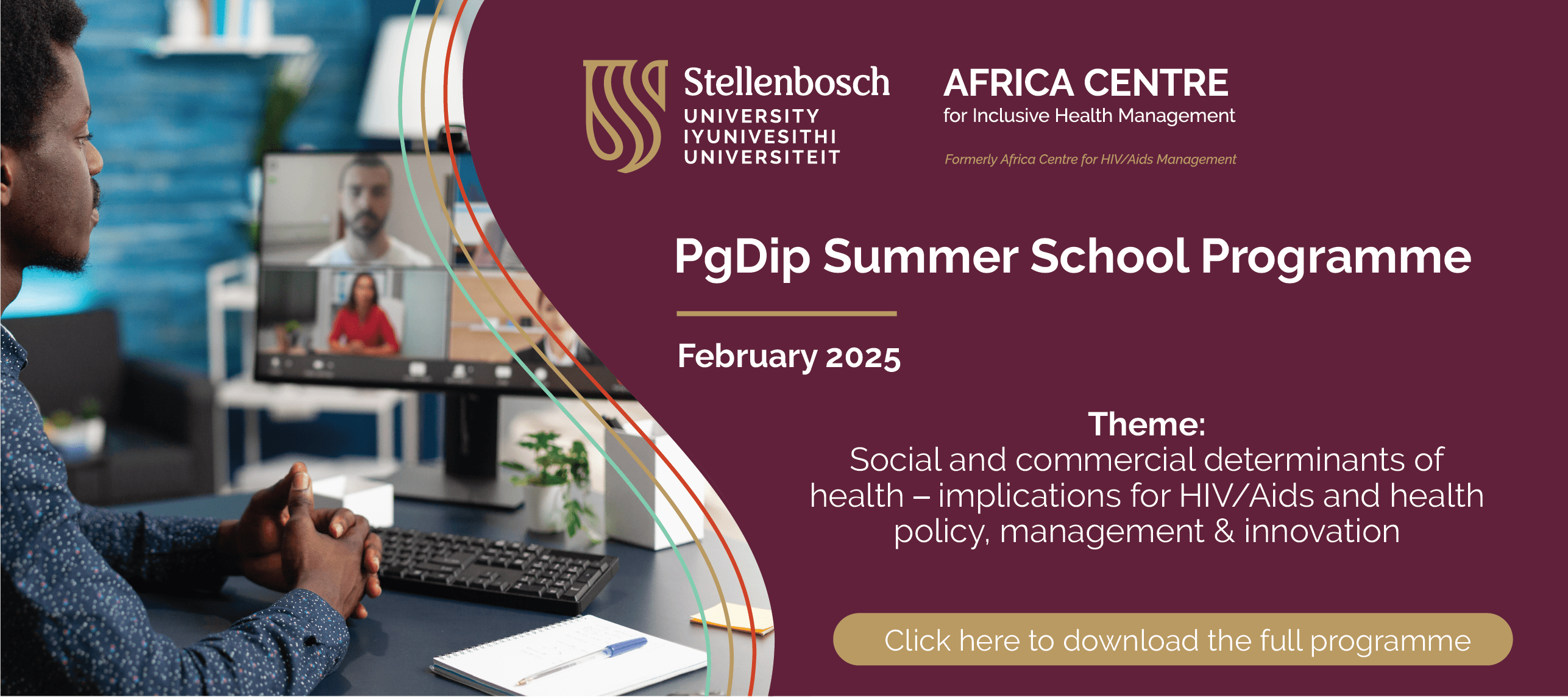Postgraduate diploma in HIV/Aids Management
PgDip summer school 2025 in pictures
Programme description
The PgDip (HIV/Aids Management) is a one-year programme and is offered in English. It is presented through hybrid learning, which includes a summer and winter school in Stellenbosch as well as interactive online sessions during the year. The diploma consists of six compulsory modules (20 credits each) and makes use of continuous assessment by means of individual assignments. Students must pass all six modules to obtain the necessary 120 credits.
Programme content
Pre-course PgDip webinar
Academic and admin info
Admission requirements
Any bachelor’s degree, national higher diploma or equivalent
Appropriate managerial experience
Computer skills (MS Word, internet and email)
Selection
A limited number of students are accepted on the basis of academic performance. Meeting the admission requirements does not guarantee selection.
Application procedure and closing date
Please apply by 30 November of the year before your prospective studies.
Application process











Outcomes of the programme
After successfully completing the diploma, students will have the knowledge and competencies to deal with the challenges and opportunities around managing all facets of HIV and Aids in the world of work.
Frequently asked questions
* These questions and answers apply to the PgDip programme. Information about the Africa Centre’s other programmes is also available on this website. Email ralex@sun.ac.za if you have any other questions.
Applications
When can I apply for the PgDip programme?
Applications are open from March until the end of November every year.
How do I apply – what is the process?
Visit https://www.aidscentre.sun.ac.za/academic-programmes/postgraduate-diploma/, go to “Application procedure and closing date” and click on “Apply here”. It will take you to the university portal for applications, where you just follow the instructions.
Under which faculty does this programme resort?
The Africa Centre for HIV/Aids Management with all its programmes is part of the Economic and Management Sciences Faculty ─ locate it at https://www.sun.ac.za/english/faculty/economy/divisions/centres-institutes.
Is this course only for South African applicants?
No, anyone who qualifies for our programmes is welcome to apply, irrespective of where they are based.
I registered for the programme previously, now I can't move to the next application level.
If you have applied before, follow the same steps and use the old application number and password that you used with your online application. Without these details, the system will not allow you to apply, in which case you need to contact info@sun.ac.za for assistance to retrieve your old details.
I need help in uploading documents in my application.
Please contact ralex@sun.ac.za for a step-by-step guide on how to submit your application and upload the relevant documents.
Do I have to apply for accommodation?
Our programmes do not require students to be in Stellenbosch full-time, therefore there is no need for accommodation, except during the in-person summer and winter school weeks.
Can I apply with my nursing diploma, which is on NQF level 6?
The academic requirement is that applicants’ qualification should be on an NQF 7 level.
The PgDip programme is on an NQF 8 level.
Do you apply RPL principles?
Yes, we apply Recognition of Prior Learning (RPL) as part of the selection process. We will advise you to apply for the programme to see if you will qualify, based on additional information we will request from you.
Admin
How much does the postgraduate diploma course cost?
The tuition fee depends on whether an applicant is a South African national, an SADC national, from the rest of Africa or from other countries. Applicants’ immigration status in South Africa is also relevant. Please contact ralex@sun.ac.za for further information.
I completed the student registration form and emailed the bank deposit slip, but have not heard anything after that.
All applications are handled by the Stellenbosch University registrar’s office and only passed to the Africa Centre once processed. Please contact ralex@sun.ac.za with your application number and names for further details.
Must I email my banking details if I want my fees to be a debit order?
Your proof of payment must be emailed to ralex@sun.ac.za ─ we do not do debit orders, as it remains the applicant’s responsibility to pay and furnish us with the proof.
Are there bursaries for the programme?
The Africa Centre does not offer any bursaries. Prospective students can contact the university’s Postgraduate Funding Office at http://www.sun.ac.za/english/research-innovation/Research-Development/postgraduate-funding-support.
Is this course suitable for palliative care nurses?
The PgDip in HIV/Aids Management qualification is suitable for any workplace and profession.
Teaching
Is this a full-time or part-time programme?
Our PgDip (postgraduate diploma) is classified as a full-time programme as it is presented in one year. People can however work while being enrolled.
Do you offer online classes? Or distance learning?
Our programmes are presented through hybrid learning, which includes in-person contact sessions as well as online sessions via MS Teams.
When do classes take place?
Classes are offered after hours during the week and on Saturday mornings, and this is done via Teams as, our programmes are hybrid (in person and online via Teams).
What must my PgDip average be if I want to do the master’s programme afterwards?
Your PgDip (or similar qualification) average mark has to be 65% to qualify for an MPhil application. If it is not, you can apply to repeat one or two modules to improve your average. Please keep in mind that even if you then obtain a 65% average, you do not automatically qualify for the MPhil. Your application will still go through our selection process.

